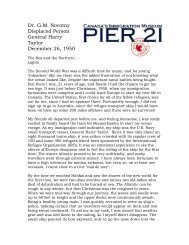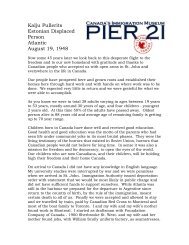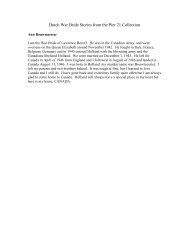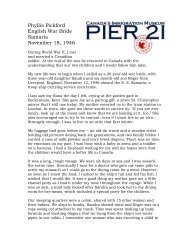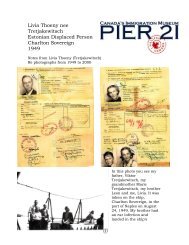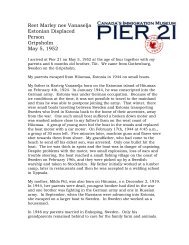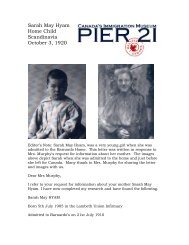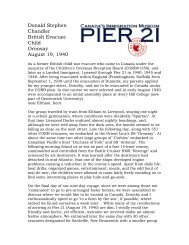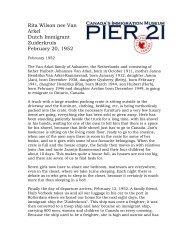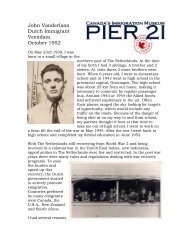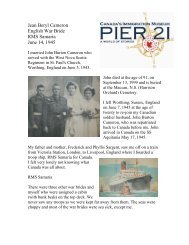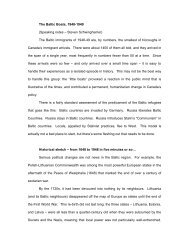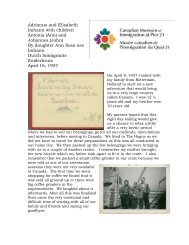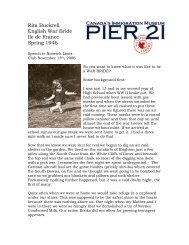Dutch and German Immigrants The Prins Family - Pier 21
Dutch and German Immigrants The Prins Family - Pier 21
Dutch and German Immigrants The Prins Family - Pier 21
Create successful ePaper yourself
Turn your PDF publications into a flip-book with our unique Google optimized e-Paper software.
(<strong>Prins</strong>) house to ask if I could come over to see my mother. It was alwaysallowed, however without enthusiasm. When the war started, our townpretty soon became a restricted area because it was situated on thecoast. Only people who lived there <strong>and</strong> had a valid reason were allowedto be there. My mother’s visits stopped then. When I think abouteverything now, I am sorry athat I didn’t visit my gr<strong>and</strong>pareants Sohlmore often, I practically went by their house every day when I went toelementary school; this must have hurt them. <strong>The</strong> first time I met myfirst mother again was after the war in 1947.Before the <strong>German</strong>s occupied IJmuiden the <strong>Dutch</strong> army was stationed inour town. Aunt Nel <strong>Prins</strong> met her future husb<strong>and</strong> at that time as he wasin the army, stationed in IJmuiden; after the war was over they did getmarried.I want to add a bit more about my gr<strong>and</strong>father <strong>and</strong> mother <strong>Prins</strong>. Opa<strong>Prins</strong> was born in Egmond <strong>and</strong> left school after finishing grade six.Egmond is a coastal town <strong>and</strong> fishing was the main source of income. Asa boy of twelve years old, he got a job on a fishing boat <strong>and</strong> became asuccessful Master of a trawler before he was twenty-three. <strong>The</strong>re was noharbour in Egmond, the trawlers used the harbour in IJmuiden <strong>and</strong>people from Egmond walked the distance between the two towns alongthe beach <strong>and</strong> this would take them 3 – 4 hours carrying their pack <strong>and</strong>some fish. Later he became a partner in the deep-sea fishing companyHoll<strong>and</strong> - Praxis. When he marrie dGrietje Zwart they settled inIJmuiden where my father was born on March 31, 1900. 11 morechildren were born to them (two died in infancy) <strong>and</strong> Oma was alwaysbusy to keep the household going. I can still remember how she slicedbread for the whole family, holding the loaf vertically against her chest<strong>and</strong> the knife horizontally, producing neat slices.Monday was washing day <strong>and</strong> a big wash it was for a family of more thanten people! No automatic washing machine or dryer yet. When theweather co-operated the clothes were hung to dry on clothes-lines strungup in the narrow lane (poort) beside the house <strong>and</strong> coming home withyour bike you had to find your way to the court-yard through the dryingwash. In the winter, the wash had to be dried indoors <strong>and</strong> the 'office'was used for that purpose; coal stove burning <strong>and</strong> the window open. Atother times I often played in this room <strong>and</strong> I especially remember ajigsaw-puzzle that I must have made a hundred times. Four separateunits made up the complete puzzle which had as subject the firstairplane flight delivering mail from Amsterdam to Batavia (now Djakarta,Indonesia). This room was also used by me to set up <strong>and</strong> play with myelectric Trix train which my dad brought along on one of his trips to<strong>German</strong>y.



